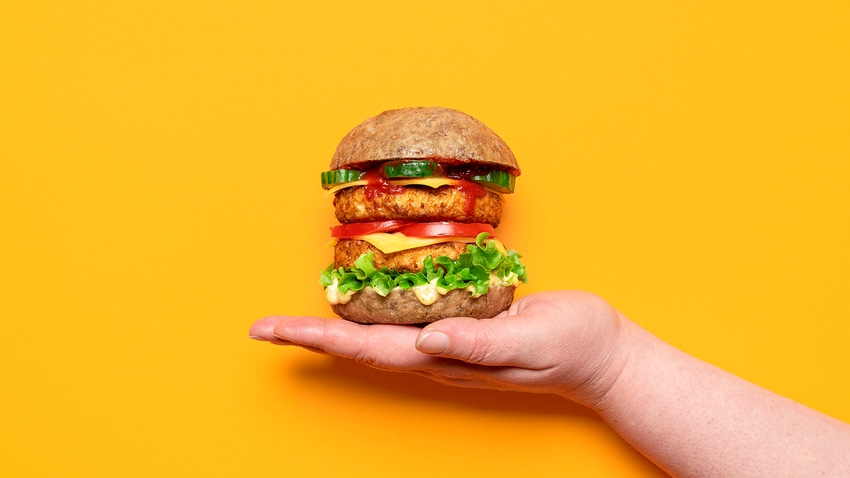Top 5 for 2024: A new year promises a food revolution driven by tech, sustainability, bold new tastes
From lab-grown dairy and innovative fermented foods to upcycled snacks and peach-infused flavors, 2024 is set to deliver a diverse range of developments in the F&B industry.

At a Glance
- Precision fermentation has led to nondairy products with textures and qualities rivaling traditional dairy.
- Clean-label ingredients are popular, as well as functional ingredients that enhance taste and texture in plant-based foods.
- New taste combinations in 2024 are expected, such as tamarind, citrus fruits and botanicals.
It’s nearing the end of the year, which means one thing: Predictions for 2024 begin rolling in, especially when it comes to foods and beverages. With the variety of innovative products on the market, it’s hard to narrow the list down. Yet, we’ve compiled a list of the top 5 food trends we expect to dominate in 2024, from nondairy products created using fermentation technologies to the latest and greatest plant-based products.
Nondairy via fermentation
Though alt-dairy milks have been utilized for millennia, they’ve gained significant momentum over the last decade, scientific research shows. Companies are now creating every type of “milk” imaginable—from almond and oat to hemp and chia—which are not only healthier and more eco-friendly options than their animal-based counterparts but have also faced scrutiny from FDA and professionals alike. Nevertheless, these beverages, as well as other nondairy foods, have continued to flourish.
In the nondairy food category, precision fermentation is proving itself a game-changer. A range of innovative products and ingredients are being introduced, and more people are open to trying products created using the technology. Food tech company Armored Fresh is making waves in the nondairy cheese space with its almond milk- and oat milk-based varieties, which achieve the meltability and texture of dairy cheeses. Alt-dairy company Better Dairy is also creating animal-free cheeses using precision fermentation—with ice cream, yogurt and chocolate in its purview—that contend with traditional dairy products.
Various food tech companies are also elevating the food industry with ingredients crafted via precision fermentation. Food tech company Perfect Day and biotech company The EVERY Co., both based in California, were some of the first companies to enter the game in 2014. Perfect Day, which develops dairy proteins, is widely known for ProFerm, a whey protein used commercially in nondairy cream cheese, ice cream and chocolate bars. The EVERY Co., which creates animal-free proteins for use in everything from alt-meat to baked goods, currently produces three products: EVERY Protein, EVERY Pepsin and EVERY EggWhite. The company recently debuted its newest innovation, EVERY Egg, in foodservice at the 3-star Michelin restaurant Eleven Madison Park in New York.
Californian food tech company EQUII, founded in 2021, makes high-protein grain flours using precision fermentation, and recently unveiled two varieties of breads. The new products, awarded the Startup Innovation Challenge’s “Ingredient of the Year in Food and Beverage” at Food ingredients Europe, feature 8 grams of complete protein and 4 grams of fiber per slice.
Food company Nature’s Fynd, which developed a fungi-based protein known as Fy, is utilizing biomass fermentation technology to create nondairy cream cheeses and yogurts, and meatless breakfast patties. The company’s newest innovation, Fy Yogurt, contains 8 grams of protein and 4 grams of fiber per 5.3-ounce container.
Plant-based everything
Fermentation and plant-based are terms that are occasionally used interchangeably, but that’s not always the case. Fermentation technologies are being utilized to create plant-based foods, such as alternative meats, but these products are also often crafted utilizing an extrusion process. In fact, extrusion has been scientifically shown to be the most common technique to transform plant-based proteins into plant-based meat products.
Take plant-based food company Before the Butcher, for example, which produces soy-based beef, chicken and pork products using an extrusion process. Also, The Plant Based Seafood Co. and Nestlé utilize extruded plant proteins to create their alt-seafood products—as do many of the food companies that debuted plant-based analogues at IFT FIRST and Plant Based World Expo North America this year.
There’s also a wide range of companies crafting ingredients specifically for use in plant-based applications to help improve taste, texture and nutritional value. Ingredient company Symrise recently launched a new line of chickpea and aquafaba flakes under its portfolio of natural ingredients, diana food. The chickpea flakes are a vegan protein option that lends improved textural properties to a wide range of applications, including falafel, snacks and dips like hummus. The aquafaba flakes act as a vegan alternative to egg yolks, also assisting with texture, as well as water and oil retention.
Scientists at the University of Guelph in Ontario, Canada, have also worked to develop ingredients for use in plant-based foods to improve vegan meats and help them taste more like their animal-based counterparts. Using the Canadian Light Source (CLS) at the University of Saskatchewan, the team of scientists—led by Alejandro Marangoni, a professor with the department of food science at University of Guelph—developed solid, plant-based fats and a vegan meat prototype with a similar texture to meat products. By rearranging molecules, they were able to turn different types of liquid oils into solids without adding saturated or hydrogenated fat and create vegan fats with similar characteristics as those of pork, beef and lamb. They published recent findings in Food Research International.
Clean-label ingredients
When it comes to functional ingredients, more F&B companies are focused on the clean-label aspect, or as some brands refer to it “label-friendly,” since sustainable solutions have become increasingly important for consumers and companies alike.
Cargill recently conducted a proprietary IngredienTracker study, which showed 65% of consumers in Europe, the Middle East and Africa (EMEA) are extremely/very likely to check the ingredients list when buying foods and beverages, up 2 points since 2019. The majority (70%) of consumers in EMEA are also looking for recognizable ingredients, with a similar number (64%) avoiding artificial ingredients. To cater to this growing contingent, the company developed a range of label-friendly ingredients, Trilisse, including proteins, fibers, starches, pectins and lecithins.
Ingredient company Kemin is also creating clean-label solutions. For example, its InnoBLQ functional proteins can help increase the crispiness and mouthfeel of battered, breaded and fried foods with less fat. Kerry also has its finger on the pulse when it comes to sustainable solutions for plant-based meat and dairy products that have cleaner labels. For the last handful of years, the company has introduced more than a dozen different ingredients made from plant-derived sources that can aid the taste, texture and mouthfeel of plant-based foods and beverages.
The future of upcycling
In line with clean ingredients lies upcycling. Per Upcycled Food Association (UFA), a nonprofit working to prevent food waste, upcycled food products prevent food waste by creating new, high-quality products out of surplus food. UFA is comprised of more than 250 members and created the first third-party upcycling certification, Upcycled Certified, in an effort to promote the benefits of upcycling and create a more circular food economy.
More companies are entering the space with upcycled ingredients primed to enhance F&B products. Ingredient company FutureCeuticals Inc., which develops clean-label functional food ingredients, recently introduced NatureKnit. The ingredient utilizes upcycled apples, carrots, blueberries, cranberries and spinach to create a functional ingredient that contains 50% natural and intact soluble and insoluble dietary fiber and polyphenols, which can be used in ready-to-mix (RTM) beverages, functional bars, smoothies, meal replacements and nutritional supplements. Cabosse Naturals, a brand by Barry Callebaut, crafts Upcycled Certified ingredients using the cacao fruit, including pulp, juice, concentrate and powder. The company said its most recent introduction, cacaofruit powder, can replace refined sugar in fat-based fillings for products like confectioneries and ice cream.
Some food companies are also utilizing 100% upcycled products to craft CPGs, such as RIND Snacks, The Ugly Co. and Dieffenbach’s Potato Chips. RIND Snacks, founded in 2017, takes fruits that are slightly irregular in shape or size and deemed cosmetically imperfect by retailers and uses a proprietary dehydration process to create all-natural fruit snacks. Founded in 2018, The Ugly Co. also utilizes “ugly” fruit to create dried fruit snacks and help avert food waste.
Colors & flavors
Like every other industry, trending colors are a big deal. Pantone is well known for its Color of the Year, which is released each December in anticipation of the new year. The 2024 Pantone Color of the Year is “Peach Fuzz,” a pinkish orange hue—a color that inspired “Peach+,” the 12th annual Flavor of the Year for 2024 from dsm-firmenich, which develops solutions for the health, nutrition and beauty industries.
“The delicate and natural qualities of Peach+ call for diverse applications across multiple food and beverage industries,” Maurizio Clementi, EVP of taste, texture and health at dsm-firmenich, said. Emotions 360, a proprietary consumer study conducted by the company that measures consumer emotions associated with ingredients, also showed peach is “somewhat unique in that it has many innate qualities that contrast, such as being bold and pampering, but also refreshing and revitalizing, and youthful, but nostalgic.”
ADM also released a Flavor and Color Trends Report, which includes a range of trending colors, from apricot and persimmon to earthy greens and refined blues. The company’s 2024 Global Consumer Trend Series report spotlights innovative technologies revolutionizing the food sector, from production enhancements to hyper-personalized solutions. This report said consumers will seek flavors and colors that “reflect their own unique personalities and desires—unapologetically gravitating towards flavors they deem delicious and shades that appeal to their aesthetics” in 2024. It even pointed to artificial intelligence (AI) advancements that track these preferences, allowing brands to respond quicker than ever to growing demands.
The company also incorporated its Outside Voice and Global Lifestyles proprietary research conducted in 22 countries throughout 2023 that showed more than three-quarters (78%) of global consumers believe food is about enjoying a multi-sensorial experience, which includes taste, colors, smell, texture and sounds.
Regarding flavors, ADM highlighted the top inspirations for 2024: caramelized fruit; sweet flavors like berries, citrus fruits and melons; nuts like pistachios; cinnamon sugar; umami; exotic flavors like blood orange, yuzu and lychee; botanicals and florals like violet and cherry blossom. The company noted an approximate 10% increase in strawberry-flavored product launches and an 8% increase in grape-flavored product launches between 2022 and 2023, according to proprietary Mintel data.
Global flavor company McCormick & Co., which also releases an annual flavor of the year, paid homage to the mix of sweet, sour, tangy and tart flavors infiltrating the market with its 2024 flavor tamarind. McCormick Flavor Solutions, one of the many McCormick & Co. brands, released the 24th edition of its Flavor Forecast, which highlights three themes expected to inspire innovations in the coming year, from sour flavors to cultural combinations.
Needless to say, 2024 is expected to pack a punch, with foods and beverages that excite the palette and incorporate one-of-a-kind flavor combinations.
About the Author(s)
You May Also Like






